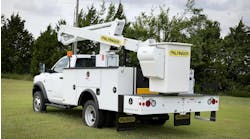NTEA climate change policy puts work truck industry at 'forefront'
NTEA – The Association for the Work Truck Industry board of directors has adopted a climate change policy designed to continue the association’s commitment to facilitating productive use of alternative fuels and advanced technologies for commercial vehicles.
“The work truck industry is at the forefront of alternative fuels and advanced technologies, and plays a key role as part of the solution to the environmental challenges we face,” Peter Miller, NTEA chair, said. “NTEA’s policy emphasizes the importance of multiple technology and fuel options on the path to zero emissions, as work trucks do not represent a one-size-fits-all situation.”
The policy explains the work truck industry represents a positive force in reducing greenhouse gas emissions. Further, it provides NTEA the opportunity to educate the public, regulators and legislators about how the industry is already putting in place solutions to society’s environmental concerns, according to the association.
“Climate change is a serious global challenge that requires long-term commitments — and every industry has a role to play,” said Mike Kastner, NTEA’s managing director who leads legislative and regulatory lobbying efforts across United States and Canada. “NTEA recognizes the work truck industry is well-positioned to make a significant difference through continued development of innovative new technologies to reduce fuel consumption and vehicle greenhouse gas (GHG) emissions. The industry will produce vocational trucks for the future that both increase overall vehicle efficiency and reduce GHGs on the path to zero emissions.”
NTEA’s principles
- NTEA supports evidence-based, scientifically grounded policy solutions that are fuel- and technology-agnostic; there are multiple paths to a zero-emissions future.
- Solutions should be data-driven.
- Industry has an important role to play in driving new technological solutions, and government policy can help create the enabling environment for such innovation.
In the new policy, NTEA reiterates it’s imperative that work trucks are included in the national discussion. Commercial vehicles play a vital role in our productive economy and represent an opportunity through which alternative fuels and advanced technologies can be effectively and rapidly deployed.
“NTEA is dedicated to building knowledge and acceptance of technologies that will reduce GHG emissions,” Steve Carey, NTEA president & CEO, said. “Further, we support and develop driver training and vehicle purchasing education to enhance vehicle efficiency.”
As part of a coordinated effort to reduce GHG emissions, NTEA calls for additional infrastructure investment along with research and innovative demonstration projects that could lead to policies mitigating road congestion. Additionally, fueling infrastructure for alternative fuels such as propane, natural gas, electric and hydrogen must be supported in order for these fuels to be adopted in the vocational truck fleet.
NTEA will
- Recognize and support programs that enhance North American manufacturing competitiveness globally through more fuel-efficient and sustainable vehicle fleets;
- Promote evidence-based federal, state, provincial and municipal government policies and regulations as well as private-sector initiatives that effectively reduce GHG emissions from work trucks;
- Encourage industry and government research that assists in determination of the best fuels or technologies for differing transportation and work truck applications;
- Educate municipalities, private fleets and the general public on availability and value of alternative fuels and fuel-efficient technologies;
- Partner with North American governments, agencies, and laboratories to support development and integration of innovative technologies and strategies reducing GHG emissions from the work truck fleet; and
- Work with industry to maximize the near-term benefits of deployable alternative fuels and advanced technologies that reduce GHG emissions and increase fuel efficiency.
For more information, visit www.ntea.com/climatechange.









